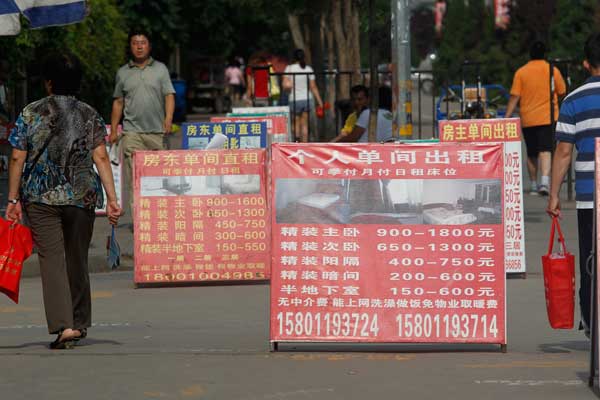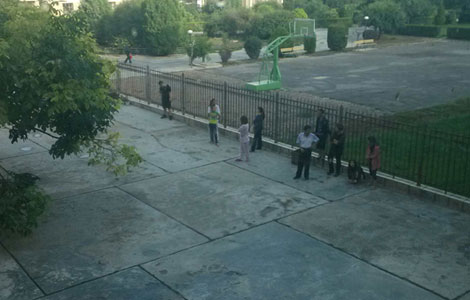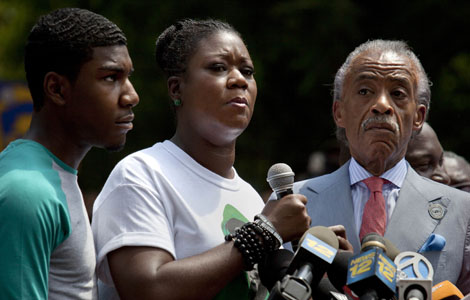Home truths for low-cost housing
Updated: 2013-07-23 00:53
By Hou Liqiang (China Daily)
|
||||||||
Problems rooted in disparity in demand and supply of cheap accommodation
When Ji Xiang leased his small Beijing apartment near the Shuangjing Subway Station in early spring, it was a standard two-bedroom flat with a living room, kitchen and bathroom. Today it is more like a hostel, housing up to 24 tenants.
Bunk beds line the walls in almost every room, each available to rent by the month.
 |
|
Property agents advertise cheap housing, many being shared units in an apartment, outside the Tiantongyuan residential community in Beijing's northern suburbs. tan qing / for China Daily |
"I'm a fresh graduate myself, so I know how difficult it can be searching for a job and a home," said Ji, who left college this year with "a Web-related degree" and has a full-time job at an Internet cafe.
He said he struck on the idea of investing in a dozen beds after seeing how his relatives had supplemented their incomes by subletting.
In Ji's opinion, he is helping the capital meet the massive demand for cheap accommodation. Only recently did he learn that cramming so many people in one place violates multiple city regulations on housing, and health and safety.
He is not the only one doing it, either. A search for "bed rentals" — the Chinese term for such properties — produces more than 25,000 postings on bj.58.com and about 7,000 more on bj.ganji.com, both major classified advertising websites in Beijing.
Official data support Ji's claim about a disparity in supply and demand. According to the National Bureau of Statistics, the capital has almost 8 million nonnative residents (people without hukou, or permanent residency, who stay six months or more). Yet the municipal public security bureau said in June last year there were only 1.39 million rental properties.
Part of the pressure on the rental market has come from Beijing's measures to cool property prices, introduced in May 2010, which included a ban on non-hukou holders purchasing homes unless they have paid social security or income tax in the capital for at least five consecutive years.
As a result, roughly 81 percent of nonnative residents of Beijing have no option but to rent, estimated Hou Jiawei, director of Population Development Studies Center of Renmin University of China.
Naturally, this has led to a spike in rental prices.
The NBS reported a rise of 6.2 percent year-on-year in June, while Li Junfu, deputy director of Beijing University of Technology's sociology department, said the increase had been "50 percent over the last three to four years".
Data compiled by real estate agency Homelink and cited by Beijing Youth Daily put the average cost of a one-bedroom property inside Fourth Ring Road today at 4,500 yuan ($733) a month. However, that is only 246 yuan less than the average starting monthly salary for this year's crop of graduates, according to a study by Zhaopin, a major recruitment company.
Young people with low salaries and new graduate jobseekers on tight budgets "will automatically gravitate toward shared housing if they don't want to live in the suburbs", Li said.
A lot of tenants
Although Ji has put plans to expand his business on hold for fear of a government crackdown on subletting, he said he will continue to advertise his beds, and expects to see no shortage of tenants in the near future.
"For a single room in a property in Shuangjing these days you need to pay 10,000 yuan up front", including three months' rent plus a deposit, he said. "It's not affordable for most young people."
Beds in his apartment cost just 380 to 700 yuan a month, depending on how many share a room, and there are discounts for those with a student card or graduate certificate.
Quilts and pillows are provided, while water, electricity, gas and heating are included in the price, he said, adding that his elder sister is in charge of cleaning.
However, tenants in such apartments enjoy far less than the 5 square meters per person required by city housing regulations, which officially took effect on July 18.
"There is often a lack of firefighting equipment, so health and safety can't be guaranteed," he said. Tenants are also vulnerable because they do not have contracts with subletters, he added.
Zhang Dawei, with the market research center of Beijing Centaline Properties, another real estate company, also said subletting is contributing to the increased rental prices.
Potential subletters will often pay above the going price to secure a property they think they can make money from by filling it with bunk beds, which distorts the market balance, he said.
"Tenants might feel like they are getting a good deal, but the prices of the apartments are soaring by as much as 50 percent in some cases," Zhang said.
In many cases, experts say, the property owner is unaware their house or apartment is being used to accommodate large numbers of tenants, while experienced private landlords generally do not divide their properties due to damage and the cost of repair.
Liu Honghui, a property lawyer, suggested landlords include a clause that forbids illegal subletting into contracts with tenants, so they may be liable if an accident caused by overcrowding happens on the property.
No easy solution
Both Li at Beijing University of Technology and Xiong with Ziroom agreed solving the problem of illegally shared housing will not be easy, especially while demand for cheap accommodation is so high.
Subletting is filling a gap, Li conceded.
"There is no firm data that show there is a lack of low-cost rental properties, but there are definitely far too few within Fifth Ring Road," he said.
"If there was enough, there would be little opportunity for subletters."
However, the two differ when it comes to creating high-capacity shared houses from large, empty properties in Beijing.
Xiong argued that with a proper design that removes hidden dangers, it would be OK for a house or apartment to have six to eight people to a room.
"Make the rooms small and safe," he said. "And make sure tenants are registered with the public security bureau."
Even with official supervision, Li said he still sees problems with large-occupancy properties being mixed in among residential communities, such as noise and environmental deterioration.
A receptionist who answered the Mayor's Hotline said city authorities regularly receive complaints about excessive noise or water leaks coming from illegally shared housing.
Li suggested apartments larger than 20 sq m set in a designated area should be included into the city's urban development plan.
"The government needs to find a way to provide more low-cost housing for lease," he added.
Most Viewed
Editor's Picks

|

|

|

|

|

|
Today's Top News
Quake in NW China kills 89, injures 700
US blacks, whites split on Zimmerman verdict: poll
Kissinger and Jiang see bright future for relations
China sees no major forex withdrawal: regulator
Business holds up for Minmetals arm
Beijing knife attack leaves one dead
Kate gives birth to a baby boy
ROK-DPRK industrial park talks end
US Weekly

|

|














